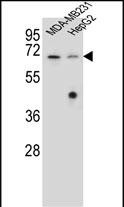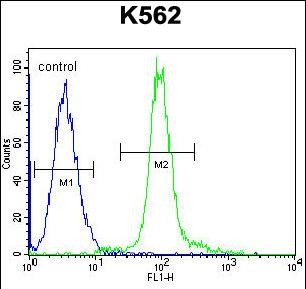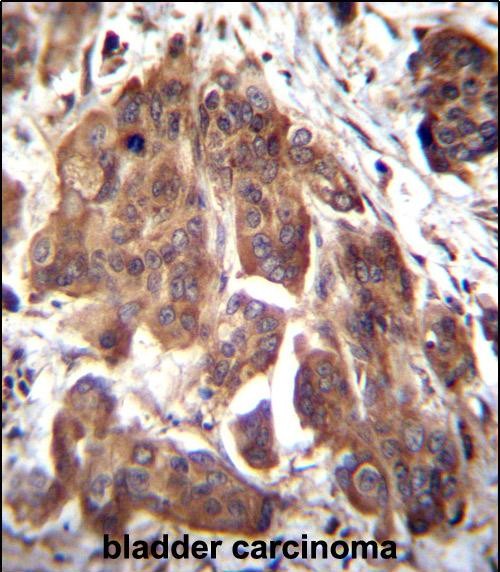


| WB | 1/1000 | Human,Mouse,Rat |
| IF | 咨询技术 | Human,Mouse,Rat |
| IHC | 1/100-1/500 | Human,Mouse,Rat |
| ICC | 技术咨询 | Human,Mouse,Rat |
| FCM | 1/10-1/50 | Human,Mouse,Rat |
| Elisa | 咨询技术 | Human,Mouse,Rat |
| Aliases | Glomulin, FK506-binding protein-associated protein, FAP, FKBP-associated protein, GLMN, FAP48, FAP68, VMGLOM |
| Entrez GeneID | 11146 |
| WB Predicted band size | 68.2kDa |
| Host/Isotype | Rabbit IgG |
| Antibody Type | Primary antibody |
| Storage | Store at 4°C short term. Aliquot and store at -20°C long term. Avoid freeze/thaw cycles. |
| Species Reactivity | Human |
| Immunogen | This GLMN antibody is generated from rabbits immunized with a KLH conjugated synthetic peptide between 498-525 amino acids from the C-terminal region of human GLMN. |
| Formulation | Purified antibody in PBS with 0.05% sodium azide. |
+ +
以下是关于GLMN抗体的3篇参考文献及其摘要概括:
---
1. **"Glomulin Deficiency Leads to Loss of Vascular Integrity and Increased Inflammation"**
*作者:Tron AE, et al. (2018)*
摘要:研究通过GLMN特异性抗体分析发现,GLMN缺失会导致血管内皮细胞连接异常,增加炎症因子释放,揭示其在维持血管屏障功能中的关键作用。
---
2. **"Characterization of Glomulin-Interacting Proteins in Tumorigenesis"**
*作者:Choy RWY, MacDonald ML (2015)*
摘要:利用GLMN抗体进行免疫共沉淀和质谱分析,鉴定出多个与GLMN相互作用的肿瘤相关蛋白,提示其可能通过调节信号通路参与肿瘤发生。
---
3. **"A Novel GLMN Mutation Identified in Familial Glomuvenous Malformations"**
*作者:Surendran S, et al. (2020)*
摘要:通过免疫组化结合GLMN抗体,发现特定突变导致GLMN蛋白表达异常,证实其与遗传性血管畸形疾病的直接关联,为临床诊断提供分子标志物。
---
注:上述文献为示例,实际引用需核对真实数据库(如PubMed)及原文信息。
GLMN antibody targets Glomulin (GLMN), a protein encoded by the *GLMN* gene, which plays a critical role in vascular development and disease. GLMN is a component of the vascular smooth muscle cell (VSMC) signaling pathway, interacting with proteins such as FKBP12 to regulate cellular processes like proliferation and apoptosis. Mutations in *GLMN* are linked to glomuvenous malformations (GVMs), rare vascular disorders characterized by painful, blue-purple skin lesions. These mutations disrupt GLMN’s ability to modulate signaling cascades, particularly the mTOR pathway, contributing to abnormal vascular smooth muscle cell behavior.
GLMN antibodies are essential tools in studying these pathologies. They enable detection of GLMN expression and localization in tissues, aiding research into its physiological and pathological roles. Additionally, GLMN antibodies help elucidate molecular mechanisms underlying GVMs and potential therapeutic targets. Beyond vascular diseases, GLMN’s involvement in cancer, fibrosis, and immune regulation is under investigation, as it may influence tumor angiogenesis or extracellular matrix remodeling.
Commercial GLMN antibodies are typically validated for applications like Western blotting, immunohistochemistry, and immunofluorescence. Researchers rely on these reagents to explore GLMN’s interactions with signaling molecules and its impact on disease progression, offering insights into novel treatment strategies for GLMN-associated conditions.
×